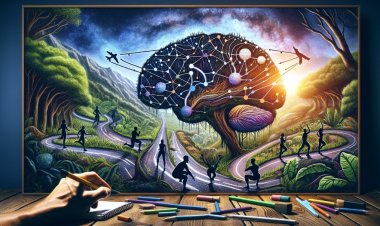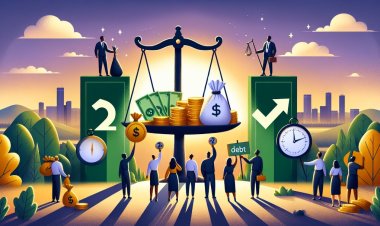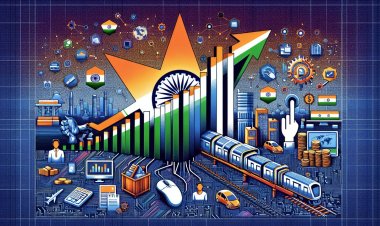Who rules America? The Power Elite and the Role of the Media
Unmask the hidden hands shaping America's destiny! Dive into the intricate web of power wielded by the elite and the media's role in influencing public opinion. Explore the complex dynamics and potential solutions for a more equitable and informed society.

Who rules America? The Power Elite and the Role of the Media
Introduction
In American politics, there are powerful forces at play that often go unnoticed by the general public. Wall Street and financial firms, for example, have an enormous influence on American politics, despite being unelected and unaccountable to the American people. These forces, along with the media, the military-industrial complex, and corporate interests, shape the direction of American politics and policies.
One of the key issues is that American politics tends to focus more on political personalities than on the actual issues at hand. This is largely due to the influence of marketing and advertising in politics. Candidates and campaigns are often marketed like products, with slogans and symbols carefully crafted to manipulate public perception. This focus on personalities rather than issues can distract from the real questions about who truly rules America.
It is important to question who holds the power in America and who benefits from the decisions made in the political sphere. Is it the American people, or is it a select group of wealthy and influential individuals and corporations? The answer is not a simple one, but there is evidence to suggest that a power elite, an interlocking network of individuals in business, politics, and the military, largely determines the parameters of possible change in America.
There is also the influence of the military-industrial complex, which has grown significantly since President Eisenhower warned about its rise in his farewell address. The military-industrial complex, along with defence contractors, has a vested interest in perpetuating wars and military spending, which can further influence American politics and policies.
Additionally, corporations and special interest groups play a significant role in shaping American politics. They do so through campaign contributions, lobbying, and funding think tanks and research institutions. This influence can undermine the democratic process and limit the power of ordinary citizens to determine the direction of their country.
Overall, the question of who rules America is complex and multifaceted. It involves examining the influence of Wall Street, financial firms, marketing and advertising, the military-industrial complex, and corporate interests. By understanding these factors, we can work towards a more informed and engaged citizenry and strive for a political system that truly represents the interests of the American people.
Power Elite: Business, Politics, and the Military
The concept of a power elite refers to an interlocking network of individuals in business, politics, and the military who largely determine the parameters of possible change in America. This power elite, comprised of wealthy and influential individuals and corporations, holds significant control over American politics and policies.
One of the key aspects of the power elite is the interconnection between business, politics, and the military. Wall Street and financial firms, for example, have enormous influence on American politics despite being unelected and unaccountable to the American people. These forces, along with the media, the military-industrial complex, and corporate interests, shape the direction of American politics and policies.
Elected officials often face constraints and limitations due to the influence of the permanent establishment, which includes the power elite. Even though elected officials have the power to make decisions, the power elite's interests and agendas frequently limit their discretion. This can limit the power of ordinary citizens to determine the direction of their country.
Progressive intellectuals and scholars at the Left Forum have been vocal in their critique of the power elite and its influence on American democracy. They argue that the power elite undermines the democratic process through campaign contributions, lobbying, and funding think tanks and research institutions. This influence can prevent ordinary citizens from having a meaningful say in shaping the policies and direction of the country.
Overall, the power elite, consisting of business, politics, and the military, plays a significant role in determining the direction of American politics and policies. Their interlocking connections and influence can limit the power of elected officials and undermine the democratic process. Understanding the presence and influence of the power elite is crucial for a more informed and engaged citizenry, as well as for working towards a political system that truly represents the interests of the American people.
The 1% and the Power Elite
The concept of the power elite refers to an interlocking network of individuals in business, politics, and the military who largely determine the parameters of possible change in America. This power elite, comprised of wealthy and influential individuals and corporations, holds significant control over American politics and policies.
C. Wright Mills, a renowned sociologist, introduced the concept of the power elite in the 1950s. He argued that this elite consisted of three main groups: corporate capitalists, the military, and the political elite. These groups work together to shape the direction of American politics and policies.
Corporate Capitalists
Wall Street and financial firms, despite being unelected and unaccountable, have enormous influence on American politics. Through campaign contributions, lobbying, and funding think tanks and research institutions, they shape policies that benefit their own interests. This influence can undermine the democratic process and limit the power of ordinary citizens.
The Military
The military-industrial complex, as warned by President Eisenhower, has a significant impact on American politics. Defence contractors and the military have a vested interest in perpetuating wars and military spending, which can influence policies and limit the power of elected officials.
Political Elite
The political elite, including national leaders in the executive branch of government, also play a crucial role in shaping American politics. Even though elected officials have the authority to make decisions, the power elite's interests and agendas frequently impose restrictions on their actions. This can limit the power of ordinary citizens to determine the direction of their country.
Overall, the power elite, consisting of business, politics, and the military, has a significant influence on American politics and policies. Their interlocking connections and influence can limit the power of elected officials and undermine the democratic process. It is crucial to understand the presence and impact of the power elite to work towards a political system that truly represents the interests of the American people.
Who rules America? The 99% and the Fight for Power
In recent years, there has been a growing movement in America that challenges the power dynamics of the country. One of the most notable examples of this is the emergence of the Occupy Wall Street movement. This movement, which began in 2011, aimed to bring attention to the inequality and corporate influence in American politics.
Occupy Wall Street challenged the institutional power of Wall Street and financial firms, who have significant influence over American politics despite being unelected and unaccountable to the American people. The movement called for a more democratic and equitable society that prioritises the needs of the 99% rather than the 1%.
At the heart of the Occupy Wall Street movement was a desire for grassroots democracy. Activists sought to challenge the existing power structures and create a more participatory and inclusive political system. They believed that true power should reside with the people rather than in the hands of a select few.
Working-class Americans played a crucial role in the Occupy Wall Street movement. They were tired of feeling powerless and voiceless in the face of corporate and elite interests. They perceived power as being concentrated in the hands of a wealthy and influential few rather than being distributed among the majority.
Activists and intellectuals played a crucial role in reshaping power dynamics within the Occupy Wall Street movement. They helped to educate and mobilise the public, raising awareness about the influence of Wall Street and corporate interests on American politics. Their efforts aimed to empower the 99% and give them a voice in the fight for power.
The fight for power in America is ongoing, and grassroots movements like Occupy Wall Street continue to challenge institutional power and advocate for a more equitable society. By recognising the role of the 99% and understanding the perspectives of working-class Americans, we can work towards a more balanced and democratic distribution of power in America.
The Role of the Media in Shaping Power
The media plays a significant role in shaping power dynamics and influencing democracy in America. However, there are several concerning issues related to media ownership and its impact on the distribution of power.
The Concentration of Media Ownership and its Impact on Democracy
One of the key issues is the concentration of media ownership. A small number of media corporations control a significant portion of the media landscape, which can limit the diversity of perspectives and voices. When a few entities have control over the majority of media outlets, it can lead to a narrowing of information and a lack of diverse viewpoints. This concentration of ownership can harm democracy by limiting the range of ideas and opinions available to the public.
The Influence of Media Corporations and Their Ties to Other Industries
Media corporations often have ties to other industries, such as the military-industrial complex or financial firms on Wall Street. These connections can create conflicts of interest and influence the editorial decisions and coverage of media outlets. For example, defence contractors may have a vested interest in promoting militarism and war, which can shape the media's coverage of international conflicts. This influence can impact the public's understanding of key issues and limit critical analysis of power dynamics.
The Lack of Transparency and Accountability in Media Ownership
Another concern is the lack of transparency and accountability in media ownership. Many media corporations are owned by conglomerates or holding companies, making it difficult to trace the ultimate owners and determine their motivations. This lack of transparency can lead to biassed reporting or the promotion of specific agendas that serve the interests of the owners rather than the public. Without transparency and accountability, it becomes challenging to identify and address potential biases or conflicts of interest in media coverage.
The Media's Focus on Personalities and the Neglect of Power Analysis
A further issue is the media's focus on personalities rather than power analysis. Political campaigns and news coverage often prioritise political figures and their personal narratives over a critical analysis of power structures and the forces that shape American politics. This focus on personalities can distract from understanding the true distribution of power in America and limit the public's ability to assess the impact of influential individuals and corporations on policies and decisions.
Overall, the role of the media in shaping power in America is a complex and multifaceted issue. The concentration of media ownership, the influence of media corporations, the lack of transparency in ownership, and the media's focus on personalities all contribute to shaping power dynamics in the country. It is important for the public to be aware of these factors and to seek out diverse sources of information to foster a more informed and engaged citizenry.
The Military-Industrial Complex and Corporate Control
The influence of military contractors on politics and policy is a significant factor in the United States. These contractors, often working closely with the military-industrial complex, have a considerable impact on shaping American politics and policies.
President Dwight D. Eisenhower coined the phrase "military-industrial complex" to describe the close relationship between the military, defence contractors, and the government. This complex has grown significantly since Eisenhower's warning in his farewell address.
Defence contractors, such as Lockheed Martin and Boeing, have a vested interest in perpetuating wars and military spending. They often lobby for increased defence budgets and work to shape policies that benefit their own interests.
Additionally, the military-industrial complex plays a role in shaping American foreign policy. The desire for profit and maintaining a strong defence industry can influence decisions made regarding military interventions and arms sales to other countries.
The revolving door between the military and private industry is another aspect of corporate control. This phenomenon refers to the movement of personnel between the military and defence contractors. It can create conflicts of interest and blur the lines between public and private interests.
Corporate control has a significant impact on democracy and the public interest. Corporations and special interest groups use their financial power to influence politics through campaign contributions, lobbying efforts, and the funding of think tanks and research institutions. This influence can undermine the democratic process, limit the power of ordinary citizens, and shape policies that prioritise corporate interests over the needs of the American people.
In conclusion, the military-industrial complex and corporate control have a profound influence on American politics and policies. The influence of military contractors, the role of the military-industrial complex in shaping foreign policy, the revolving door between the military and private industry, and the impact of corporate control on democracy and the public interest are all important factors to consider when examining who truly rules America.
The Power of Money in Politics
In American politics, money plays a significant role in influencing policy decisions and shaping the direction of the country. The concentration of wealth and power among a small percentage of Americans has led to a system where the interests of the wealthy are prioritised over the needs of the majority.
One of the key factors in the power of money in politics is the role of campaign contributions. Corporations and wealthy individuals can donate large sums of money to political campaigns, which can sway the decisions and priorities of elected officials. This can lead to a system where politicians are more responsive to the desires of their wealthy donors than the needs of their constituents.
Additionally, the lobbying power of corporations has a major influence on elections and policy decisions. Corporations can hire lobbyists to advocate for their interests and push for policies that benefit their bottom line. As a result of the influence of corporate interests, this can distort the democratic process by obstructing the voices and concerns of common citizens.
The concentration of wealth and power among a small percentage of Americans also has implications for campaign finance reform and transparency. There is a need for stricter regulations on campaign contributions and more transparency in the political process. This would help to reduce the influence of money in politics and ensure that elections and policy decisions are more representative of the interests of the American people.
In conclusion, the power of money in politics is a significant issue in American democracy. The concentration of wealth and power among a small percentage of Americans, the lobbying power of corporations, and the need for campaign finance reform and transparency all contribute to a system where the interests of the wealthy are prioritised over the needs of the majority. It is important to address these issues to create a political system that truly represents the interests of all Americans.
The Influence of Media Ownership on Democracy
When discussing the power dynamics in America, it is important to consider the influence of media ownership on democracy. The ownership of media companies by mutual fund companies has become increasingly common. This concentration of media ownership can limit the diversity of perspectives and voices in the media landscape.
The lack of diversity in media ownership has a significant impact on representation. When a few entities control the majority of media outlets, it can lead to a narrowing of information and a lack of diverse viewpoints. This lack of diversity can harm democracy by limiting the range of ideas and opinions available to the public.
Furthermore, media companies often prioritise ratings and revenue over journalistic integrity. The focus on ratings and revenue can lead to sensationalism and a lack of critical analysis. This can undermine the role of the media in informing the public and holding those in power accountable.
Additionally, media ownership can restrict investigative reporting and alternative viewpoints. Media companies may have ties to other industries, such as the military-industrial complex or financial firms on Wall Street. These connections can create conflicts of interest and influence the editorial decisions and coverage of media outlets. This restriction on investigative reporting and alternative viewpoints can limit the public's understanding of key issues and prevent them from accessing a wide range of perspectives.
Overall, the influence of media ownership on democracy is a complex issue. The concentration of media ownership, the lack of diversity in ownership, the focus on ratings and revenue, and the restriction of investigative reporting and alternative viewpoints all contribute to shaping power dynamics in America. It is important for the public to be aware of these factors and to seek out diverse sources of information to foster a more informed and engaged citizenry.
Conclusion: Challenging the Power Elite
To challenge the power elite and create a more equitable society, there are several important factors to consider.
The need for a more informed and engaged public
One of the first steps towards challenging the power elite is to have a more informed and engaged public. This requires individuals to take the time to educate themselves about the structures of power and the forces at play in American politics and society. By staying informed and actively participating in the democratic process, individuals can begin to challenge the power dynamics that exist.
The importance of media literacy and critical thinking
Media literacy and critical thinking skills are crucial to challenging the power elite. As mentioned earlier, the media plays a significant role in shaping power dynamics in America. By developing media literacy skills, individuals can better analyse and interpret media messages, recognise bias, and seek out diverse sources of information. Critical thinking skills also allow individuals to question and challenge the narratives presented by those in power.
The role of grassroots movements in challenging power dynamics
Grassroots movements, such as Occupy Wall Street, have played a significant role in challenging power dynamics and advocating for change. These movements bring attention to the inequality and corporate influence in American politics and strive to create a more democratic and equitable society. By mobilising and organising at the grassroots level, individuals can work together to challenge the power elite and bring about meaningful change.
The potential for change through collective action and awareness
Collective action and awareness are powerful tools for challenging the power elite. By coming together as a collective, individuals can amplify their voices and demand change. Through awareness-raising efforts, such as social media campaigns and community organising, individuals can educate others about the presence and impact of the power elite and inspire action.
By taking these steps and actively challenging the power elite, there is potential for change and a more equitable distribution of power in America. It requires an informed and engaged public, media literacy, grassroots movements, collective action, and awareness. By working together, individuals can strive for a political system that truly represents the interests of the American people.



 admin
admin 










